【最新】仁爱版八年级英语下册unit7 Topic1 sectionD教案设计
最新版仁爱英语八年级下册Unit7topic1重点知识点总结及练习--最新版
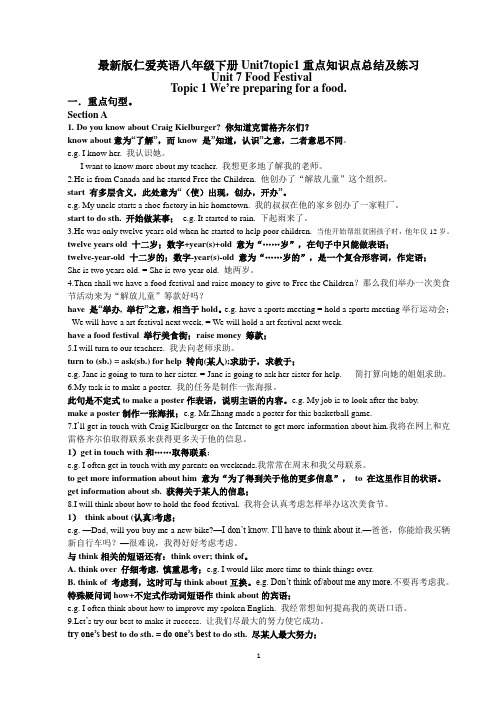
最新版仁爱英语八年级下册Unit7topic1重点知识点总结及练习Unit 7 Food FestivalTopic 1 We’re preparing for a food.一.重点句型。
Section A1.Do you know about Craig Kielburger? 你知道克雷格齐尔们?know about意为“了解”,而know 是”知道,认识”之意,二者意思不同。
e.g. I know her. 我认识她。
I want to know more about my teacher. 我想更多地了解我的老师。
2.He is from Canada and he started Free the Children. 他创办了“解放儿童”这个组织。
start 有多层含义,此处意为“(使)出现,创办,开办”。
e.g. My uncle starts a shoe factory in his hometown. 我的叔叔在他的家乡创办了一家鞋厂。
start to do sth. 开始做某事;e.g. It started to rain. 下起雨来了。
3.He was only twelve years old when he started to help poor children. 当他开始帮组贫困孩子时,他年仅12岁。
twelve years old 十二岁;数字+year(s)+old 意为“……岁”,在句子中只能做表语;twelve-year-old 十二岁的;数字-year(s)-old 意为“……岁的”,是一个复合形容词,作定语;She is two years old. = She is two-year old. 她两岁。
4.Then shall we have a food festival and raise money to give to Free the Children?那么我们举办一次美食节活动来为“解放儿童”筹款好吗?have 是“举办, 举行”之意,相当于hold。
仁爱版英语八年级下册8B Unit7_Topic1_SectionD_随堂练习(含答案)

Unit 7 Topic 1 Section D 随堂练习一、根据汉语提示完成句子,每空一词。
1. No matter where you go, remember to ______ ______ ______ ______ (与……取得联系) me.2. He ______ ______ ______ (尽最大努力) and succeeded at last.3. —Tony, could you please help me ______ ______ ______ (摆放餐具)?—With pleasure.4. ______ ______ ______ ( 为了) protect our environment, everyone should do something useful.5. When I meet difficulties, I always face them bravely ______ ______ (而不是) giving up.二、用方框中所给单词的适当形式填空。
success, imagine, India, roof, west1. —Do you think Yao Ming is a ________ basketball player?—Yes. I think he’s the best player in China.2. Julia comes from the south of Asia. She likes ________ curries very much.3. In most ________ countries, people have bread and milk for breakfast while Chinese enjoy porridge(粥) and vegetables.4. The strong wind and the heavy rain broke many ________ of the houses in the village last night.5. I ________ that Michael will be quite excited when he knows the truth.三、单项选择。
仁爱版八年级下册英语unit-7-topic1教案
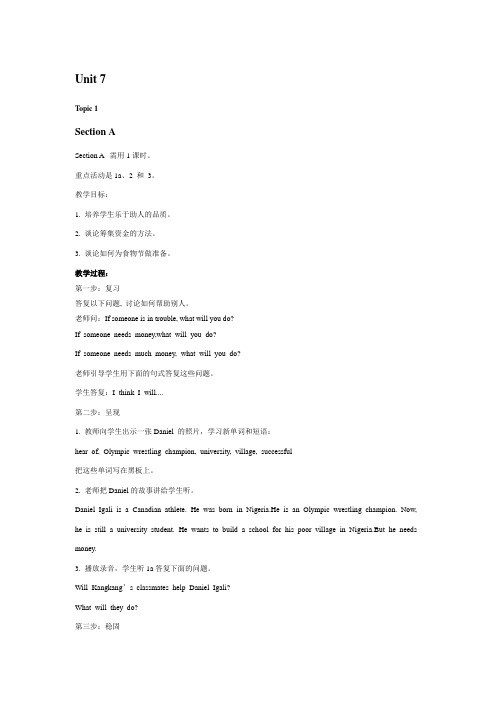
Unit 7Topic 1Section ASection A 需用1课时。
重点活动是1a、2 和3。
教学目标:1. 培养学生乐于助人的品质。
2. 谈论筹集资金的方法。
3. 谈论如何为食物节做准备。
教学过程:第一步:复习答复以下问题, 讨论如何帮助别人。
老师问:If someone is in trouble, what will you do?If someone needs money,what will you do?If someone needs much money, what will you do?老师引导学生用下面的句式答复这些问题。
学生答复:I think I will....第二步:呈现1. 教师向学生出示一张Daniel 的照片,学习新单词和短语:hear of, Olympic wrestling champion, university, village, successful把这些单词写在黑板上。
2. 老师把Daniel的故事讲给学生听。
Daniel Igali is a Canadian athlete. He was born in Nigeria.He is an Olympic wrestling champion. Now, he is still a university student. He wants to build a school for his poor village in Nigeria.But he needs money.3. 播放录音,学生听1a答复下面的问题。
Will Kangkang’s classmates help Daniel Igali?What will they do?第三步:稳固1. 播放录音,让学生跟读并模仿。
2. 读1a对话,完成1b。
3. 两人一组活动,老师把重点句型写在黑板上,让学生看着表演1a的对话。
完成1c。
仁爱版八年级英语下册教学设计:Unit7Topic3SectionD

(一)导入新课
1.教师通过展示一组社会公益活动的图片,如志愿者服务、捐款现场等,引发学生对公益话题的关注。
2.邀请学生分享他们对这些图片的感受,以及在生活中参与公益活动的经历。
3.引导学生关注本章节的主题——社会公益活动,为新课的学习做好铺垫。
(二)讲授新知
1.词汇教学:教师呈现本节课的关键词汇,如volunteer, donation, charity, fundraising等,引导学生学习和记忆。
-组织学生进行句型转换练习,巩固时态知识。
3.阅读理解:指导学生阅读课文,提取关键信息,理解文章主旨。
-提问:“What is the main idea of this section?”;
-指导学生通过略读、寻读等策略,了解文章大意;
-分析文章结构,讲解重点句型。
(三)学生小组讨论
1.教师提出讨论话题:“What kind of charity activities do you think are important?”,要求学生用英语发表观点。
-摘录文章中的重点词汇和表达;
-概括文章大意;
-写出自己对文章的理解和感悟。
4.课后实践:鼓励学生利用周末时间参与一次社会公益活动,如志愿者服务、捐款等,并记录下自己的经历和感受。在下一节课分享给同学们。
5.词汇复习:要求学生利用课余时间,通过词汇卡片、在线词汇游戏等形式,巩固本章节所学词汇。
教师应在下次课前收集学生的作业,并进行认真批改和反馈。通过作业的布置与检查,了解学生的学习进度和存在的问题,为下一步的教学提供依据。同时,鼓励学生在完成作业的过程中,积极思考、主动探究,提高自己的英语综合运用能力。
此外,学生在情感态度与价值观方面,对社会公益活动的认识相对有限,需要教师在教学过程中加以引导和培养。通过本章节的学习,学生将有机会拓展视野,增强社会责任感,培养关爱他人、回馈社会的意识。
仁爱版八年级英语下册教案:Unit7Topic1SectionD教案
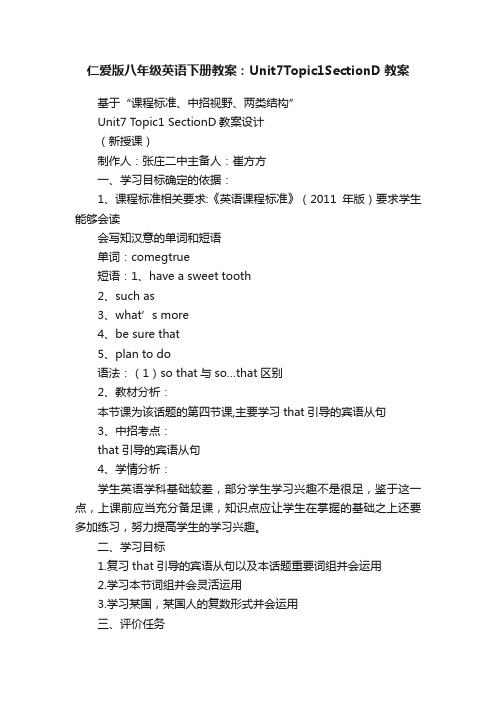
仁爱版八年级英语下册教案:Unit7Topic1SectionD教案基于“课程标准、中招视野、两类结构”Unit7 Topic1 SectionD教案设计(新授课)制作人:张庄二中主备人:崔方方一、学习目标确定的依据:1、课程标准相关要求:《英语课程标准》(2011年版)要求学生能够会读会写知汉意的单词和短语单词:comegtrue短语:1、have a sweet tooth2、such as3、what’s more4、be sure that5、plan to do语法:(1)so that与so…that区别2、教材分析:本节课为该话题的第四节课,主要学习that引导的宾语从句3、中招考点:that引导的宾语从句4、学情分析:学生英语学科基础较差,部分学生学习兴趣不是很足,鉴于这一点,上课前应当充分备足课,知识点应让学生在掌握的基础之上还要多加练习,努力提高学生的学习兴趣。
二、学习目标1.复习that引导的宾语从句以及本话题重要词组并会运用2.学习本节词组并会灵活运用3.学习某国,某国人的复数形式并会运用三、评价任务1、针对目标1,通过学习SectionA-C的生词,让学生并能熟练说出、写出生词,并能进行英汉互译。
2、针对目标2,通过熟读1a,能够说出1a的知识点,能够熟练做题。
3、针对目标3,会运用so that与so…that四、教学过程教学活动评价要点要点归纳学习目标目标1:通过学习Sectio nA-C 的生词,让学生并能熟练说出、写出生词,并能进行英汉互译自学指导11.自学内容:复习课本sectionA-C的重要词组2.自学方法:自学+讨论3.自学时间:6分钟4.自学要求:会读,会运用所学词组。
词组复习1.向…寻求帮助2.和…取得联系3.考虑4.尽全力做…5.对要做的事遗憾6.与某人作斗争7.以便,为了8.结果9.感谢...10.爱吃甜食11.足够好12.而且13.我相信…14.邀请某人去做某事自学检测1( )1. She didn’t sing the song ____ at the party last night.A. enough goodB. well enoughC. enoughwell D. good enough( )2. Jenny’s teeth are not good, because she ____.A. has a sweet toothB. has sweet toothC. have a sweet toothD. have sweet teeth( )3. Yesterday I rode to school instead____ a taxi.A. takingB. of takingC. tookD. of took( )4. When you have some difficult math problems, you can ____ your math teacher.A. turn toB. to askC. turnD. ask for1.通过复习P5生词,让学生练说出、写出生词,并能进行英汉互译。
仁爱英语初中八年级下册Unit7 Topic 1 Section C课件
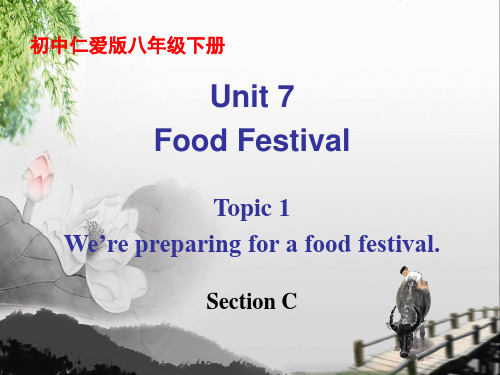
Read 1a carefully and find out the following phrases.
1. hold on 稍等,别挂电话 2. a few seconds later 几秒之后 3. What’s up? 怎么了?发生什么啦? 4. I’d love to. 我很想/愿意去。 5. be pleased to do sth. 很高兴去做某事 6. keep up the good work 干得好
2a Read and understand
Dear Kangkang, Thank you for inviting me to your food festival. I’m sorry I’m not able to go. Let me tell you something about myself, Nigerian children and my village school. I was born in Nigeria and I’m a wrestler. I came to Canada in 1994. My favorite food is fried chicken. Wrestling, of course, is my favorite sport. I won a gold medal in the 2000 Sydney Olympics.
4. When did he win a gold medal? He won a gold medal in the 2000 Sydney Olympics. 5. What is the school in his village like? It is very old and small and has only a few school supplies. When it rains, the children in the classroom all get wet.
仁爱版八年级英语下册第七单元Topic1SectionD教案
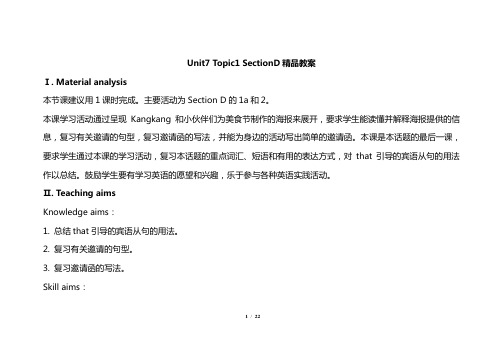
Unit7 Topic1 SectionD精品教案Ⅰ. Material analysis本节课建议用1课时完成。
主要活动为Section D的1a和2。
本课学习活动通过呈现Kangkang和小伙伴们为美食节制作的海报来展开,要求学生能读懂并解释海报提供的信息,复习有关邀请的句型,复习邀请函的写法,并能为身边的活动写出简单的邀请函。
本课是本话题的最后一课,要求学生通过本课的学习活动,复习本话题的重点词汇、短语和有用的表达方式,对that引导的宾语从句的用法作以总结。
鼓励学生要有学习英语的愿望和兴趣,乐于参与各种英语实践活动。
Ⅱ. Teaching aimsKnowledge aims:1. 总结that引导的宾语从句的用法。
2. 复习有关邀请的句型。
3. 复习邀请函的写法。
Skill aims:1/ 221. 能听懂接近正常语速的有关美食和美食节话题的语段,识别主题,并获取主要信息。
2. 能就邀请他人参加美食节的话题进行交谈。
3. 能从所给海报中找出有关信息。
4. 能写出简单的邀请函。
Emotional aims:有学习英语的愿望和兴趣,乐于参与各种英语实践活动。
Ⅲ. The key points and difficult pointsKey points:1. 总结that引导的宾语从句的用法。
2. 复习有关邀请的句型。
3. 复习邀请函的写法。
Difficult points:从所给海报中找出有关信息,并用含有宾语从句的句子进行讨论。
2/ 22Ⅳ. Learning strategies在学习中善于结合图文信息深入理解主题。
Ⅴ. Teaching aidsComputer multimedia projector, two or three posters Ⅵ. Teaching procedures3/ 22Ⅶ. Blackboard design9/ 22Unit7 Topic1 SectionD精品教案Ⅰ. Material analysis本节课建议用1课时完成。
最新】仁爱版八年级英语下册unit7
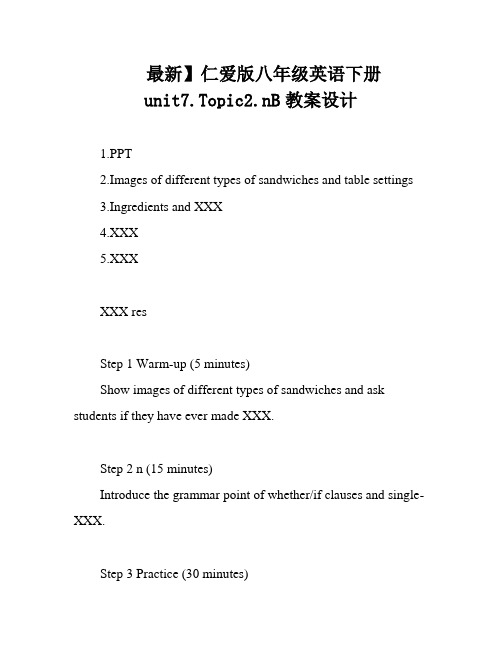
最新】仁爱版八年级英语下册unit7.Topic2.nB教案设计1.PPT2.Images of different types of sandwiches and table settings3.Ingredients and XXX4.XXX5.XXXXXX resStep 1 Warm-up (5 minutes)Show images of different types of sandwiches and ask students if they have ever made XXX.Step 2 n (15 minutes)Introduce the grammar point of whether/if clauses and single-XXX.Step 3 Practice (30 minutes)Divide students into small groups XXX them to use English to describe the process of making the sandwiches and to ask for n or help if needed。
Monitor their progress and provide XXX.Step 4 n (15 minutes)Ask students to research and present on the table settings and dining customs of a country other than their own。
Encourage them to think about how these XXX and values of the country.Step 5 Closure (5 minutes)Review the key points of the lesson and ask students to reflect on what they have XXX the world of food and culture through their English studies.XXXAssign a writing task in which students describe the process of making a XXX.XXX the use of a computer XXX display pictures of sandwiches and snacks。
Unit7 Topic1 SectionD-仁爱版英语八年级下册随堂小测

仁爱英语八年级下Unit7Topic1 Section D 随堂小测(附答案解析)一.小试牛刀,翻译短语为了筹钱致力于儿童的权利使某人的梦想成真改善学生们的健康开始做某事start/begin doing sth.筹集钱尽某人最大努力做某事向某人求助.与某人取得联系与某人保持联系与某人失去联系在网上举办一次食物节爱吃甜食二、情景交际你想告诉你好友让你们使他的梦想成真,你可以这么说:你想告诉Lucy迈克尔和他的朋友们听说了他的计划,你可以这么说:你想告诉同学们下星期天你们班要开家长会,你可以这么说:三.巩固练习:翻译下面的句子,体会There be句型的各种时态和结构1.昨天中国北方下了一场大雪。
2.明天印度南部将有一场大雪。
3.英国西部有大雾。
4.美国东部过去常刮大风。
5上周一班和二班进行了一场排球赛。
6.明天将在操场上举办一场运动会。
7.北京的交通总是很拥挤。
8/过去在街道两边有很多大树。
四、选择题1.—There're still some problems for him.—He must try his best to make it ____.A.successB.a successC.easy2. —I'm sorry, Kate. I forgot to bring your dictionary.—____. You can bring it tomorrow.A.Thank youB.No sorryC..Never mind3. The doctors tried their best ____ the dying girl's life, but they failed at last.A.saveB.saving C .to save4. He drove too fast last night. ____, he hit the wall.A.Such asB.As a resultC.As soon as5. —I think all the teachers will help those hard-working students ____ Li Juan.—I agree with you.A.such asB.for exampleC..like六. 根据首字母或汉语提示填空1. May I i you to my birthday party?2. We can s many kinds of cookies to customers in our restaurant.3. I wish your food festival a big s !4. I’m afraid he (没空).5. Let’s make his dream (实现).6. Can you sing a song in _(俄语)?7. We have lots of __(学校用品)here.8. The lazy boy passed the exam. What a _(令人吃惊)!9. Mary studies hard ___(为了)go to college. 3 / 710. The students are __(为…做准备)their English competition.七. 用所给单词的适当形式填空1. Thank you for (help)me with my English.2. Let’s try our best (not make)our teacher angry.3. What about (buy)a sandwich for him?4. You can make an (invite)to them.5. Five minutes later he (leave)for Beijing.参考答案及解析一in order to raise money.work for.the rights of childrenmake one's dream come trueimprove the students' healthstart/begin to do sth.raise money.try/do one’s best to do sth.turn to sb./ask sb. for helpget in touch with sb.keep in touch with sb.lose touch with sb.on the Internethave/hold a food festivalhave a sweet tooth二.Let’s make his dream come true.Michael and his friends heard about his plan.There is going to be a parents’meeting in our class next Sunday.三There was a heavy snow in the north of China yesterday.There will be a heavy in the south of India tomorrow.There is strong fog in the west of Britain.There used to be strong winds in the east of America.There was a volleyball match between class one and class two last weekThere will be a sports meeting on the playground tomorrow.There is a lot of traffic on the road in Beijing.There used to be many big trees on both sides of the street.四、【答案】B【解析】句意:对他来说仍然还有一些问题。
八年级英语下册 Unit7Topic1SectionD课件 仁爱湘教版
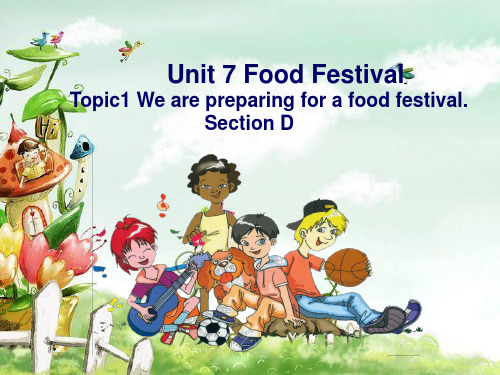
The end!
6. Would you like _to_d_r_in_k_ (drink) green tea with me? 7. You can make an _in_v_ita_t_io_n_ (invite) to her.
二、单项选择。
( B ) 1. I will____ our teacher_____ help.
Welcome to Ren’ai International Food Festival! It will be held from 11:00 a.m. to 5:00 p.m. on the _p_la_y_g_r_o_u_n_dof Ren’ai International school. We want to _h_e_lp__ Daniel raise money to _b_u_il_d a new village school in Nigeria. Daniel is an Olympic _w_r_e_st_li_n_g champion. We’ll try our best to make his _d_re_a_m_ come true.
Yours, ______
一、根据首字母或所给提示完成句子。 1. I believe we’ll r_a_is_e___ a lot of money for him. 2. I wish your food festival a big s_u_cc_e_s_s__. 3. Can you _im__a_g_in_e_(想象) what you will be when you grow up? 4. I’m afraid I _h_a_v_e_n_o__tim__e_(没空). 5. Let’s make his dream __c_o_m_e_t_ru_e__(实现).
八年级英语下册 Unit7 Topic1单词和配套练习 仁爱版
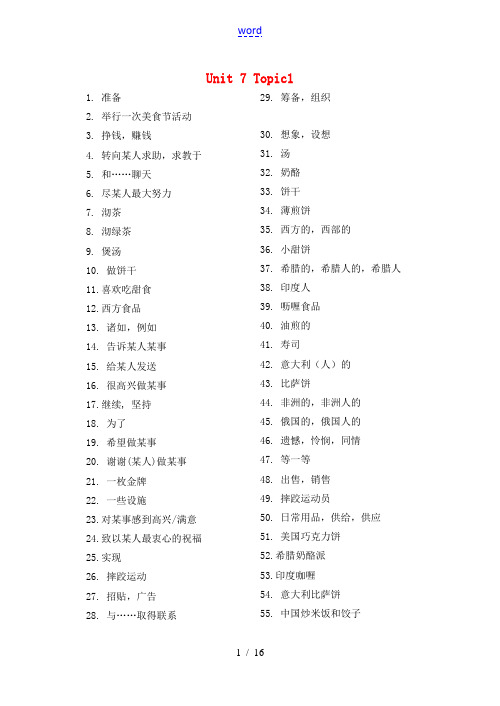
wordUnit 7 Topic11. 准备2. 举行一次美食节活动3. 挣钱,赚钱4. 转向某人求助,求教于5. 和……聊天6. 尽某人最大努力7. 沏茶8. 沏绿茶9. 煲汤10. 做饼干11.喜欢吃甜食12.西方食品13. 诸如,例如14. 告诉某人某事15. 给某人发送16. 很高兴做某事17.继续, 坚持18. 为了19. 希望做某事20. 谢谢(某人)做某事21. 一枚金牌22. 一些设施23.对某事感到高兴/满意24.致以某人最衷心的祝福25.实现26. 摔跤运动27. 招贴,广告28. 与……取得联系29. 筹备,组织30. 想象,设想31. 汤32. 奶酪33. 饼干34. 薄煎饼35. 西方的,西部的36. 小甜饼37. 希腊的,希腊人的,希腊人38. 印度人39. 呖喱食品40. 油煎的41. 寿司42. 意大利(人)的43. 比萨饼44. 非洲的,非洲人的45. 俄国的,俄国人的46. 遗憾,怜悯,同情47. 等一等48. 出售,销售49. 摔跤运动员50. 日常用品,供给,供应51. 美国巧克力饼52.希腊奶酪派53.印度咖喱54. 意大利比萨饼55. 中国炒米饭和饺子56. 日本寿司58. 俄罗斯黑面包57. 南非咖喱牛肉Unit 7 Topic1AMaria: We know Daniel Igali wants to build a new school for his poorvillage in Nigeria.Jane: I think money must be a problem for him.K(Kangkang): Shall we 1 to raise money for his school?Jane: Good idea! 2 haveit?K: I think we can have it on our school playground on Sunday.Maria: I will 3 .Michael: My task is to make a poster.K: Go od! I’ll 4 Daniel on the Internet to get more information abouthim.Jane: I will think about how to organize the food festival.Maria: Great! Let’s 5 to make it successful.BJane: Hello, Michael! 1 cook for the foodfestival?M(Mi chael): I’m thinking about that. 2 ,and I think a lot of students will buy western food, such as Americanchocolate cookies and Greek cheese pies.Jane: Wow! That’s a good idea. I like Indian food, so I 3 Indian curries.K(Kangkang): Wonderful! I think Chinese fried rice and Japanese sushiare easy to cook. 4 , I’m sure that fried rice anddumplings will be popular.Maria: You’re right. But what should I serve, Italian pizza, South African beef curry or Russian black bread?K: I think beef curry is OK.M: That’s good enough. I believe we’ll 5 for Daniel Igali.CO(Operator): Hello! No.37 High School.K(Kangkang): Hello! Extension 6006, please.O: OK. 1 , please.U(Uncle Yang): (A few seconds later) Hello!K: Hello! Uncle Yang, this Kangkang.U: 2 ? Kangkang?K: We’re going to have an international food festival to raise money for a village school in Nigeria.3 ?U: What a surpris e! I’d love to. 4 ? K: On our school playground on May 16th. It’s Sunday. You must e to our food festival.U: OK. I’m pleased to hear that. 5 , Kangkang!Unit 7 Topic 1 Section AI.根据首字母提示填空1. Can I have another bowl of chicken s?2. He ordered an Italian c pizza.3. You can i how useful the fax machine is.4. He lives in a small v far away from the city.5. P is a kind of thin, dry cake.II.选择题1. Tomorrow I will get in touch my friends the Internet.A. at, inB. with, onC. to, onD. to, through2. He tries his best English well.A. to learnB. learnC. learningD. learns3. I think she will be here soon.A. whenB. while c. that D. if4. He is my good friend and I him.A. know aboutB. know ofC. knowD. know from5. I turn to our teachers when I’m in trouble.A. WillB. ShallC. WouldD. Would like6. I’m a new er, so I ask the driver go there.A. how toB. where toC. when toD. what toIII.从II 栏中找出与I栏相对应的答语I( ) 1. Do you know about him?( ) 2. Shall we have a party next Sunday?( ) 3. Do you think the children need to make cheese pies? ( ) 4. When and where shall we meet?( ) 5. How do you chat with your friends?IIA. No, I don’t think so.B. At the school gate tomorrowmorning.C. On the Internet.D. No, I don’t.E. Good idea!Section BI.用方框中所给单词的适当形式填空1. Everyone for the sports meet at the moment.2. Peter doesn’t like to eat curries.3. cultures are different from those in the east.4. I often invited my friends dinner.5. Would you like me up later on?6. chicken is very popular in America.7. — Thank you very much.. — It’s a .II.选择题1. What would you like to cook the food festival?A. onB. ofC. forD. at2. I often my hometown when I am in Beijing.A. think overB. think aboutC. thinkD. think of3. The book is for children to read. There are few new words in it.A. enough easyB. easy enoughC. enoughdifficultD. difficultenough4. We should the people.A. serve forB. serve toC. serveD. serve at5. —I’m sorry I lost your pen. —I have another one.A. Never mind.B. You’re weleC. That’s rightD. You must pay for it6. —I missed the wonderful sports meeting last week. —.A. How nice it is!B. I’m so sorry!C. What a pity!D. Sounds great!7. I her again three years later.A. will meetB. metC. am going to meetD. meet8. —Would you like to e to my party this Saturday?— Sure, .A. I’m afraid notB. but I’m sorry I can’tC. that’s good enoughD. I’d love toSection CI.根据汉语提示填空1. When it rains, the children in the classroom(全身淋湿)2. They are going to (举办美食节) next month.3. — Hello! Could I speak to Tom, please?—(请稍等)), please. He is ing soon.4. You are making progress. (继续努力)the good work., Kangkang.5. Wele to our store! We have many different things(出售).II.选择题1. — Hello! . — Just a minute.A. That is Li Ming.B. Can I speak to Mrs. Wang, please?C. Who is this?D. I am Mr. Han.2. Thank you me the news.A. to tellB. to tellingC. for tellD. for telling3. I’m very to see you again.A. pleaseB. pleasureC. pleasedD. pleasing4. The worker works hard make a lot of moneyA. in orderB. in order toC. on order thatD. so that5. Don’t stop. Please keep .A. runningB. runC. to runD. runs6. — We should do something to help the poor children. What about money for them? — That would be very nice.A. raiseB. riseC. raisingD. rising7. — We’ll have an Englishevening party on Christmas day. May Iinvite you to e? —I’d love to.A. How surprised!B. How bored!C. How boring!D. What a surprise!8. The school in my village has only a few school .A. suppliesB. supplyC. supplyingD. to supplyIII.从方框中选择适当的选项补全对话T(Tony): Hello, Nancy!N(Nancy): Hi, Tony! T: 1 ?N: I Think so. What ’s up?T: 2 ? There ’s a new restaurant near the station.N: I’d love to, but I’m sorry I can ’t. 3 .T: Oh, that ’s too bad. 4 ?N: Sunday? Let me see. Yes, I think I will be free.T: Great. When shall we meet?N: At six o ’clock, OK? T: Sounds great. 5 .N: All right. See you then.T: See you.IV .完形填空When Italians talk about their cooking to foreigners, they always think of pizza 1 . But today ’s pizza is different 2 the old ones. In the past, it was hard to make pizza. 3 years went by, the 4 used a new way to make pizza. Then it was 5 to make pizza.A long time ago, there were several kingdoms in Italy. 6 , they became one country. During this time, Italians got some new ideas 7 cooking. The most interesting idea was to make pizza. The first pizza was not so delicious and did not look nice. 8 the cooks in Italy tried to make it better. Then this kind of food began to look nice and taste delicious soon it became popular around the country. Most people liked it because it was 9 , nourishing (富有营养的),simpleto make and nice to eat.Now Americans eat more pizza than 10 do every day. Maybe many people in China are enjoying pizza as a meal. Do you like it?1. A. first B. firstly C. for the first time D. at first2. A. / B. with C. from D. in3. A. With B. From C. In D. As4. A. cook B. cooks C. cooker D. cookers5. A. easiest B. easier C. easily D. more easily6. A. Later B. Latest C. Late D. Lately7. A. on B. for C. as D. by8. A. But B. Because C. Why D. So9. A. dear B. cheap C. dearer D. cheaper10. A. Chinese B. Italians C. Australians D.JapaneseSection DI.根据首字母或汉语提示填空1. May I i you to my birthday party?2. We can s many kinds of cookies to customers in our restaurant.3. I wish your food festival a big s!4. I’m afraid he (没空).5. Let’s make his dream (实现).II.用所给单词的适当形式填空1. Thank you for (help) me with my English.2. Let’s try our best (not make) our teacher angry.3. What about (buy) a sandwich for him?4. You can make an (invite) to them.5. Five minutes later he (leave) for Beijing.III.选择题1. Look! The little baby his mother.A. looksB. looks likeC. likeD. is looking2. He imagined basketball with Tom on the playground.A. playB. playedC. playingD. to play3. Keep , and you will be .A. to try, successB. trying, successC. to try, successfulD. trying, successful4. — This is Xiao Wu speaking. Is Tom in? — the line, please.A. HoldB. KeepC. GetD. Take5. — I’m pleased his work. What about you? — I’m proud him.A. with, withB. at, aboutC. with, ofD. about, for IV.阅读理解根据广告内容,完成下列各题1. The Happy Holiday Hotel stands at .2. Maria wants a double room for three days at Blue Sky Hotel, so she should pay .3. Restaurants at the Happy Holiday Hotel open .4. If Maria wants to ride a horse, she should call .5. The double rooms at the Blue Sky Hotel are more expensive because they have .Unit 7 Topic 1 自测题I.词汇A.根据汉语提示填空1. Can you sing a song in (俄语).2. We have lots of (学校用品)here.3. The lazy boy passed the exam. What a (令人吃惊的).4. Mary studies hard (为了)go to college.5. The students are (为……做准备)theirEnglishpetition.B.选出与句中画线部分意思相同或相近的选项6. Hold the line, please.A. Wait for meB. Hold onC. Hands upD. Write a message7. Shall we have a food festival?A. hasB. hadC. holdD. held8. Let’s try our best to study English well.A. doB. makeC. didD. made9. I shall turn to our teachers.A. help our teachersB. turn to helpC. ask our teacher for helpD. help myself10. Ihave a sweet tooth.A. have a good toothB. like eating sweet foodC. make my tooth sweetD. like my teethII.选择题1. That crying baby is to see his mother.A. pleaseB. pleasingC. pleasesD. pleased2. Mary tells her mother she will her a letter when she gets to London.A. sendB. send forC. send offD. send out3. I believe we’ll raise a lot of money for Daniel Igali.A. thatB. whatC. ifD. when4. He works hard and tries his best to make his dream .A. e onB. e outC. e trueD. e over5. The twins are making a for the food festival.A. postB. posterC. inviteD. invitation6. Linda plans to cook pizza.A. ItaliansB. ItalyC. ItaliesD. Italian7. I’m thinking about to do on New Year’s Day.A. howB. whatC. whenD. where8. This village school is very small and has few .A. classroomB. deskC. supplyD. supplies9. Mary decide go shopping with her parents.A. not toB. didn’tC. doesn’tD. isn’t to10. When it rained, we all wet.A. becameB. turnedC. changedD. got11. I’m very pleased with you will do for me.A. whatB. whereC. whenD. how12. Would you like to have dinner with me ?A. in this Sunday eveningB. on this Sunday eveningC. at this Sunday eveningD. this Sunday evening13. Please give my to your friends.A. hopeB. wishC. hopesD. wishes14. The maths problem is a little difficult. Please .A. think of itB. think it ofC. think it overD. think over itIII.从方框中选择适当的选项补全对话Ann: Good afternoon, Tom!Tom: Good afternoon. I’m glad that you have e on time.Ann: Happy birthday to you, Tom 1Tom: Thanks a lot. What’s in it? 2 Oh! Wonderful! Chinese noodles, my favorite food.Ann: Yes, this kind of noodles is made for birthday. We eat noodles on birthday, because they are the symbol(象征)of longevity(长寿). Tom: Is that so? 3Ann: 4 And hope you make more progress(进步)with your study. Tom: 5IV.完形填空An important question about eating out is who pays for the meal. If a friend of yours asks you to have lunch with him, you may say 1 like this, “I’m afraid it’ll have to be someplace 2 , as I have very little money.” The other person may say, “OK, I’ll meet you at McDonald’s.”This means that the two agree to go Dutch, that is, each person pays for himself. He may 3 say, “Oh, no. I want to 4 you to lunch at Smith’s .”or “I want you to try Chinese dumplings there. They’re great.”This means the person wants to pay for both of you. If you feel 5 towards this person, you can go with him and you 6 pay for the meal. You may just say “ 7 . That would be very nice.”American customs(习俗)about who pays for dates(约会)are much the same as those in the other parts of the world. In the old days,American women wanted men to pay for all the meals. But today, a university girl or a woman in8 will usually pay her way during the day. If a man asks her fora dance outside the working hours, it 9 “e as my guest.”S o as you can see, it is a polite thing to make the question 10 at the very beginning.1. A. something B. anything C. everything D. nothing2. A. expensive B. cheap C. quiet D. wonderful3. A. also B. neither C. too D. either4. A. get B. bring C. meet D. take5. A. kind B. friendly C. happy D. lucky6. A. can’t B. needn’t C. mustn’t D. don’t7. A. I’m sorry B. Excuse me C. Thank you D. Pardon8. A. school B. China C. America D. business9. A. goes B. says C. means D. tells10. A. clear B. careful C. clean D. easyV.阅读理解ABob likes to eat spaghetti(意大利面条). Every Friday he goes to an Italian restaurant and eats spaghetti for lunch.Phyllis is a waitress(女服务生)at the Italian restaurant. Phyllis and Bob always talk and laugh. They bee good friends.After Bob ate spaghetti at the restaurant. He paid for his lunch. Then he asked Phyllis, “Do you want a tip today, or do you want half of my lottery ticket(彩票)?”“Half of your lottery ticket?”Phyllis asked. “Yes,”Bob said, “I have a lottery ticket. If I win the lottery, you will get half of the money.”Phyllis laughed. “OK,” she said, “I don’t want a tip today.I want half of the lottery money!” She laughed again.The next day, Bob won the lottery. He won six million dollars. Bob went to the Italian restaurant. “Here is your tip,” Bob told Phyllis.1. Where does Bob go every Friday?A. To his friend’s restaurant.B. To an Italian restaurant.C. To his friend’s house.D. To a restaurant to talk with his friend.2. Who is Phyllis?A. Bob’s friend.B. Bob’s wife.C. A waitress.D. Both A and C.3. How much money did Bob give to Phyllis?A. 3,000,000 dollars.B. 300,000 dollars.C. 6,000,000 dollars.D. Some of the money.4. From the last passage, we know Bob is .A. smartB. honestC. luckyD. happy5. Which of the following is TRUE?A. Bob eats spaghetti for lunch every day.B. Bob gives Phyllis money to buy lottery ticket.C. If Bob doesn’t win the lottery, Phyllis won’t get the tip for that day.D. Phyllis doesn’t want the tip because they’re friends.BDo you know the benefits(益处)of potatoes? 12 Africa is the hometown of potatoes. Later potatoes were grown all over the world. First people only ate them uncooked. 34 Men and women, young and old enjoy eating them very much. It is said that potatoes can be cooked into 400 kinds of cooked vegetables.In the past some people thought they could make people fat and were afraid of eating them too often. But in fact, they do not make people fat but keep people thin. 5根据短文内容,用选项把空缺的句子还原A. As the time passed, people learned to cook them deliciously.B. It is nearly the king of all vegetables and all foods.C. Now potatoes have bee delicious food or cooked vegetables at table.D. So you can enjoy them as often as possible if you like,E. As we know, people were first grown in Africa.Unit 7 Topic1 参考答案Section AI. 1. soup 2. cheese 3. imagine 4. village 5. PancakeII. 1. B 2. A 3. C 4. A 5. B 6. AIII. 1. D 2. E 3. A 4. B 5. CSection BI. 1. is preparing 2. Indian 3. Western 4. to have5. to call6. Fried7. pleasureSection CI. 1. all get wet 2. hold/have a food festival 3. Hold on4. Keep up5. for saleII. 1. B 2. D 3. C 4. B 5. A 6. C 7. D 8. AIII. 1. C 2. E 3. D 4. A 5. BIV. 1. A 2. C 3. D 4. B 5. B 6. A 7. A 8. D 9. B 10. B Section DI. 1. invite 2. supply 3. success 4. has no time 5. e true II. 1. helping 2. not to make 3. buying 4. invitation 5. left III. 1. B 2. C 3. D 4. A 5. CIV. 1. Tianchang Road 2. 120 yuan/¥120 3. 24 hours4. 0858-********5. bathroomsUnit 7 Topic 1 自测题I. A. 1. Russian 2. school supplies 3. surprise 4. in order to5. preparing forB. 6. B 7. C 8. A 9. C 10. BII. 1. D 2. A 3. A 4. C 5. B 6. D 7. B 8. D 9. A10. D 11. A 12. D 13. D 14. CIII. 1. C 2. A 3. E 4. D 5. BIV. 1. A 2. B 3. A 4. D 5. B 6. B 7. C 8. D 9. A 10. AV. A. 1. B 2. D 3. A 4. B 5. CB. 1. B 2. E 3. A 4. C 5. D。
仁爱版七年级英语下册说课稿:Unit7Topic1SectionD

反思和改进措施:
1.根据学生的反馈和表现,调整教学方法,提高教学针对性。
2.加强对学生的个别辅导,关注每个学生的学习进度。
3.不断丰富教学资源,提高课堂活动的趣味性和实践性。
4.定期进行教学反思,总结经验教训,不断提升教学质量。
2.角色扮演:学生两两一组,模拟真实生活中的问路情景,进行角色扮演练习。
3.创作练习:让学生绘制一张自己学校的地图,并用英语标注路线,向同伴介绍。
4.阅读理解:让学生阅读相关的英语文章,提取关键信息,回答问题。
(四)总结反馈
在总结反馈阶段,我将采取以下方式:
1.让学生自我评价:让学生回顾本节课的学习内容,总结自己在新知识掌握、口语表达和合作交流方面的表现。
2.同伴评价:学生相互评价,给予同伴积极的反馈和建议。
3.教师反馈:我将对每个学生的表现进行点评,强调优点,指出需要改进的地方,并提供具体的建议。
(五)作业布置
课后作业旨在让学生巩固课堂所学,提升实际应用能力。作业包括:
1.家庭作业:要求学生用英语写一篇关于如何到达学校某个地点的指南。
2.视频作业:鼓励学生录制一段角色扮演的视频,模拟问路和指路的场景。
3.使用不同颜色和粗细的粉笔,区分重点和次重点,增强视觉效果。
4.适时引导学生关注板书,解释板书中的知识点,帮助学生理解记忆。
(二)教学反思
在教学过程中,我预见到以下可能的问题或挑战:
1.学生在角色扮演过程中可能出现紧张、忘词等情况。
2.部分学生对方位词的掌握不够熟练,容易混淆。
3.阅读理解能力较弱的学生可能对短文中的细节信息提取困难。
1.创设真实情境,让学生在角色扮演中体验英语问路和指路的乐趣。
仁爱版八年级英语下册Unit7Topic1SectionD教学设计
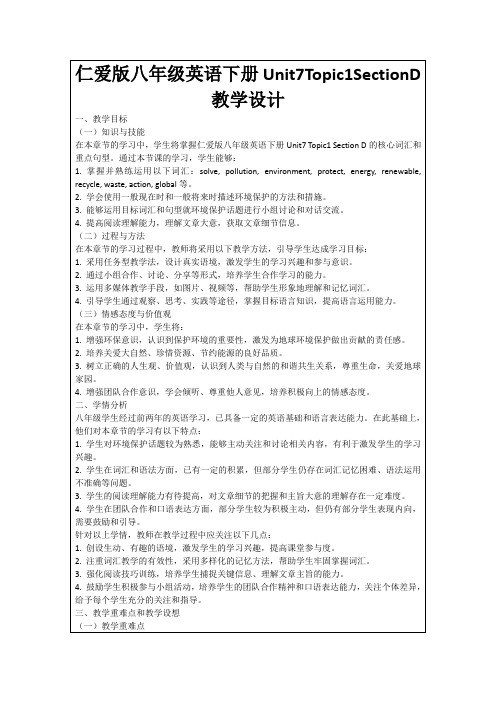
(三)学生小组讨论,500字
1.教师将学生分成小组,每组选择一个环保主题,如节约能源、减少垃圾、保护水资源等。
2.学生在小组内用本节课所学的词汇和句型进行讨论,探讨如何解决所选主题下的环保问题。
3.每个小组汇报讨论成果,分享各自的观点和措施,其他小组进行评价和反馈。
1.学生对环境保护话题较为熟悉,能够主动关注和讨论相关内容,有利于激发学生的学习兴趣。
2.学生在词汇和语法方面,已有一定的积累,但部分学生仍存在词汇记忆困难、语法运用不准确等问题。
3.学生的阅读理解能力有待提高,对文章细节的把握和主旨大意的理解存在一定难度。
4.学生在团队合作和口语表达方面,部分学生较为积极主动,但仍有部分学生表现内向,需要鼓励和引导。
三、教学重难点和教学设想
(一)教学重难点
1.词汇和语法:本章节涉及的环保主题词汇和一般现在时、一般将来时的语法结构是教学的重点和难点。学生需要熟练掌握并运用这些词汇和语法进行表达。
-教学设想:通过实物展示、图片辅助、情景模拟等多种方式,帮助学生形象记忆词汇。同时,设计丰富的语言实践活动,如角色扮演、小组讨论等,让学生在实际语境中运用语法,提高语言输出的准确性和自然性。
-对话时长不少于5分钟。
3.创意作业:制作一份环保主题的海报,内容包括:
-环保口号或标语。
-本节课学习的词汇和句型。
-突出至少一个环保问题的解决方案。
4.阅读拓展:阅读一篇关于环保的英文文章,完成以下任务:
-摘录文章中的关键信息。
Байду номын сангаас-总结文章的主旨大意。
-阐述自己对文章中提到的环保措施的看法。
仁爱版英语八年级下册 Unit 7 Topic 1--3同步练习卷含答案不全
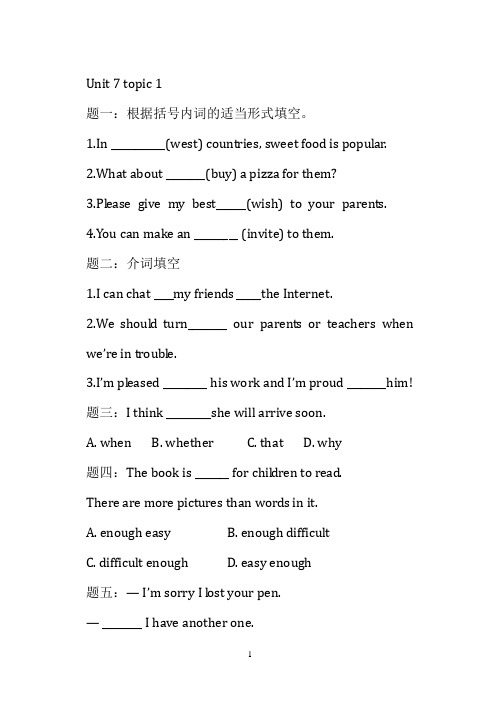
Unit 7 topic 1题一:根据括号内词的适当形式填空。
1.In ___________(west) countries, sweet food is popular.2.What about ________(buy) a pizza for them?3.Please give my best______(wish) to your parents.4.You can make an _________ (invite) to them.题二:介词填空1.I can chat ____my friends _____the Internet.2.We should turn________ our parents or teachers when we’re in trouble.3.I’m pleased _________ his work and I’m proud ________him! 题三:I think _________she will arrive soon.A. whenB. whetherC. thatD. why题四:The book is _______ for chil dren to read.There are more pictures than words in it.A. enough easyB. enough difficultC. difficult enoughD. easy enough题五:—I’m sorry I lost your pen.— ________ I have another one.A.Never mind.B. You’re wel come.C. Give me money.D. Oh, really?题六:Could you please _________ here?It’s a non-smoking restaurant.A. to smokeB. not to smokeC. smokeD. not smoke题七:—Would you like to come to my party this Saturday? — Sure, ________.A. I’m afraid notB. I’d love toC. that’s good enoughD. I do题八:按要求完成句子。
仁爱版八年级英语下册Unit7Topic1SectionC教学设计

在讲授新知环节,我会通过PPT展示一般现在时的构成、意义和用法。我会用简洁明了的语言讲解,并结合示例让学生理解和掌握。例如,我会展示一个句子:“He often goes to the library.”并让学生观察这个句子中的一般现在时的标志词“often”。然后,我会让学生尝试构造类似的一般现在时句子,并给予及时的反馈和指导。
仁爱版八年级英语下册Unit7Topic1SectionC教学设计
一、教学目标
(一)知识与技能
(二)过程与方法
在本节课的教学过程中,我将采用任务型教学法,通过设置各种任务,引导学生主动参与学习,提高学生的学习兴趣和积极性。例如,在学含有新词汇的句子。在阅读理解环节,可以让学生分角色扮演文本中的角色,进行情景模拟,从而提高学生的口语表达能力和阅读理解能力。
四、教学内容与过程
(一)导入新课
在导入新课环节,我会通过多媒体展示一张关于学校活动的图片,比如运动会或者歌唱比赛,引导学生观察并思考这些活动通常在什么时间进行。然后,我会提问:“Do you often participate in school activities? What activities do you like?”让学生根据自己的经历进行回答,从而引出一般现在时的话题。接着,我会向学生介绍一般现在时的概念和用法,为新课的学习做好铺垫。
对于本节课的内容,学生可能对于一些新词汇和语法结构有所陌生,需要通过大量的练习来巩固。在教学过程中,我需要通过设计各种任务和活动,帮助学生理解和掌握新知识,提高他们的英语应用能力。同时,我还需要注重培养学生的情感态度和价值观,引导他们正确对待英语学习,形成积极向上的学习态度。
三、教学重难点和教学设想
1.针对新词汇的学习,我将会通过多媒体展示单词的图片,引导学生进行观察和思考,从而激活他们的背景知识。然后,我会通过例句和练习,让学生理解和掌握单词的用法。此外,我还会设计各种任务和活动,让学生在实际情景中运用新词汇,从而加深他们的记忆和理解。
仁爱英语八年级下册Unit-7-Topic-1-Section-A
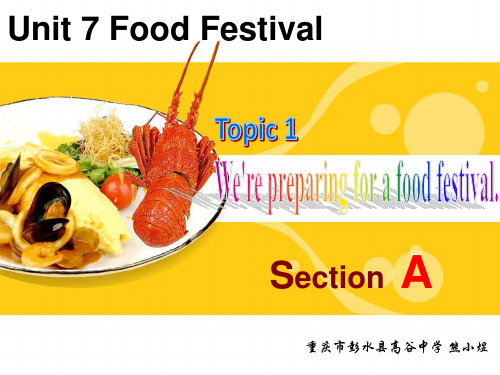
world.( T ) 4.Free the Children plans to build a school in Kenya.( T )
5.Kangkang will call Craig to get more information about
Thank You!
1b Listen to 1a and mark T(True) or F(False).
1.Craig is a twelve-year-old Canadian boy.( F )
2.Craig started Free the children to help poor
children.( T )
blind
adj.瞎的,失明的
In rural China, there are such a group of children——The Left-behind Children.Their parents go out to work in order to survive.They have to stay in the countryside, living with grandma and grandpa.They need our help.What can we do for them?Discuss and report your ideas to the class.The following information and pictures may help you.
Free the Children
Kenya
He is a very kind man. Now he is trying his best to build a new
仁爱英语八年级下Unit 7 Topic 1 Section D

04 Unit 7 Topic 1 Section D的教学方 法
添加章节标题
仁爱英语八年级下Unit 7 Topic 1 Section D的概述
仁爱英语八年级下Unit 7 Topic 1 Section D的简介
内容涵盖:本部 分主要介绍了如 何保持健康的生 活方式包括饮食、 运动和休息等方 面的建议。
展示学生的优秀 作业和作品让学 生感受到自己的 努力和进步
分享学生的学习 心得和经验让学 生互相学习共同 进步
鼓励学生积极参与 课堂讨论和活动提 高学生的自信心和 表达能力
定期进行学习成 果展示和分享让 学生看到自己的 进步和成长
对教学方法和效果进行反思和总结不断提高教学质量
教学方法:采用互 动式教学注重学生 参与和实践
设计互动环节鼓励学生积极参与课堂活动
游戏教学法:通过设计有趣的游戏让学生在游戏中学习英语 角色扮演法:让学生扮演不同的角色进行英语对话提高口语表达能力 合作学习法:让学生分组合作共同完成英语任务提高团队协作能力
问题解决法:设计一些英语问题让学生通过讨论和思考来解决提高解决问题的能力
对学生的学习情况进行跟踪和反馈及时调整教学策略
仁爱英语八年级下Unit 7 Topic 1 Section D的教学 内容
仁爱英语八年级下Unit 7 Topic 1 Section D的词汇和短语
重点词汇:describechrcteristicdescribe sb s... 常用短语:be described sIt is sid tht... 扩展词汇:tritreputtionscribe... 词汇运用:通过例句展示词汇在实际语境中的用法。
仁爱英语八年级下Unit 7 Topic 1 Section D的语法点
- 1、下载文档前请自行甄别文档内容的完整性,平台不提供额外的编辑、内容补充、找答案等附加服务。
- 2、"仅部分预览"的文档,不可在线预览部分如存在完整性等问题,可反馈申请退款(可完整预览的文档不适用该条件!)。
- 3、如文档侵犯您的权益,请联系客服反馈,我们会尽快为您处理(人工客服工作时间:9:00-18:30)。
unit7 Topic1 sectionD教案设计Ⅰ. Material analysis本节课建议用1课时完成。
主要活动为Section D的1a和2。
本课学习活动通过呈现Kangkang和小伙伴们为美食节制作的海报来展开,要求学生能读懂并解释海报提供的信息,复习有关邀请的句型,复习邀请函的写法,并能为身边的活动写出简单的邀请函。
本课是本话题的最后一课,要求学生通过本课的学习活动,复习本话题的重点词汇、短语和有用的表达方式,对that引导的宾语从句的用法作以总结。
鼓励学生要有学习英语的愿望和兴趣,乐于参与各种英语实践活动。
Ⅱ. Teaching aimsKnowledge aims:1. 总结that引导的宾语从句的用法。
2. 复习有关邀请的句型。
3. 复习邀请函的写法。
Skill aims:1. 能听懂接近正常语速的有关美食和美食节话题的语段,识别主题,并获取主要信息。
2. 能就邀请他人参加美食节的话题进行交谈。
3. 能从所给海报中找出有关信息。
4. 能写出简单的邀请函。
Emotional aims:有学习英语的愿望和兴趣,乐于参与各种英语实践活动。
Ⅲ. The key points and difficult pointsKey p oints:1. 总结that引导的宾语从句的用法。
2. 复习有关邀请的句型。
3. 复习邀请函的写法。
Difficult points:从所给海报中找出有关信息,并用含有宾语从句的句子进行讨论。
Ⅳ. Learning strategies在学习中善于结合图文信息深入理解主题。
Ⅴ. Teaching aidsComputer multimedia projector, two or three posters.Step InteractionpatternStudent activity Teacher activityIntroduction (8 minutes)1. The wholeclass work.2. The wholeclass work.3. The wholeclass work.4. Group work.5. The wholeclass work.6. The wholeclass work.1. Focus their attentionon the teacher.2. Students report theinvitations they writtenafter class, and invitetheir teachers to theinternational foodfestival.3. Students learn how towrite the invitationbetter.4. Students play thegame: Brainstormingand say the sentencepatterns about invitation.5. Students tell the namesof the typical foodsand introduce whichcountries the each flagbelongs to.6. Students tell theanswers.1. Greet students ready forlearning.2. Teacher asks the studentsto report the invitationsthey written after class, whichinvite their teachers to theinternational food festival.3. Teacher evaluates thestudents’ productions.Encourage them to writebetter next time.4. Teacher asks the studentsto play the game:Brainstorming. Let studentssay the sentence patternsabout invitation, and theteacher write down themon the blackboard.Example:(1) Would you like …?(2) What/How about…?(3) May I invite you to…?5. Teacher asks the studentsto tell the names of thetypical foods in the posterof 1a and introduce whichcountries the each flagbelongs to.6. Teacher asks the studentsto tell the answers. Encouragethem to add more wordsabout t he foods.Presentation (10 minutes) 1. Individualwork.2. The wholeclass work.3. The wholeclass work.4. Individualwork.5. The wholeclass work.6. The wholeclass work.7. Individualwork.1. Students show the postersthey prepared. Discussthe information theposters contained.2. Students report theirresults of discussing.3. Students look at thepicture of Craig in theposter and tell somethingabout Craig.4. Students read the posterand know about thegeneral idea of it.5. Students read the posteragain and answer thequestions.6. Students check theanswers.7. Students find out theanswers to wh-questionsfrom the poster.1. Teacher shows two or threeposters to the students andasks the students to showthe p osters they prepared.Discuss the informationthe posters contained.2. Teacher asks the studentsto report their results ofdiscussing. Teacher helpsthem to make a summary:A poster usually gives answersto wh-questions, i.e. what,when, where, why, who, etc.3. Teacher asks the studentsto look at the picture ofCraig in the poster andlets the students to tellsomething about Craig.4. Teacher asks the studentsto read the poster andknow about the generalidea of it.5. Teacher asks the studentsto read the poster againand answer the questions:(1) When and where willKangkang and hisclassmates have thefood festival?(2) Why will they havethe food festival?6. Teacher asks two studentsto tell the answers.7. Teacher asks students tofind out the answers towh-questions, what, when,where, why and who. Checkthe answers.Consolidation (10 minutes) 1. The wholeclass work.2. The wholeclass work.3. Group work.4. Group work.5. The wholeclass work.6. Group work.7. Pair work.8. The wholeclass work.1. Students read the posterafter the recordingsentence by sentence.2. Students try to followthe speed, paying attentionto the pronunciationand intonation.3. Students talk with theirpartners about the posterin 1a, using the objectclause.4. Students discuss ingroups to find out thedifficult points and sumup the main points.5. Students underlinein their books and makesome notes. Learn andgrasp the new wordsand phrases.6. Students make aconversation about invitingsomebody to the foodfestival based on thecontent of the poster.7. Students act out theirconversations.8. Students grasp the contentthe poster contained.1. Teacher plays the recordingsentence by sentence.2. Teacher plays the recordingwithout stopping.3. T eacher asks the students totalk with their partners aboutthe poster in 1a, using theobject clauses.Example:I know that …I think that…I imagine that…4. Teacher asks the studentsto learn in groups to find outthe difficult points in theposter. At last let them sumup the main points of theposter.5. Teacher makes a summary toexplain the key points anddifficult points to the students.(1) the rights of …(2) come true6. T eacher asks the students towork in groups. Let themmake a conversation aboutinviting somebody to thefood festival based on thecontent of the poster.7. Teacher lets the students fromdifferent groups act out theirconversations.8. Teacher evaluates students’performances.Practice (10 minutes) 1. Individualwork.2. The wholeclass work.3. Individualwork.4. The wholeclass work.5. In dividualwork.6. The wholeclass work.7. Group work.8. Individualwork.9. The wholeclass work.10. The wholeclass work.1. Students fill in the blanksof the grammar tablewith the correct words.2. Students check theanswers.3. Students find out moreobject clauses fromSections A-C.4. Students read thesentences aloud.5. Students fill in theblanks of the functionstable with the correctwords.6. Students check theanswers.7. Students discuss ingroups.8. Students write theinvitation based on thegiven information, payingattention to the form ofthe invitation.9. Students share theirinvitations to the wholeclass.10. Students grasp the waysof writing invitationsfurther.1. Teacher asks the students toread through Sections A-Cand fill in the blanks of thegrammar table with thecorrect words.2. Teacher asks two students totell the answers.3 Teacher lets the students findout more object cl ausesfrom Sections A-C.4. Teacher lets the studentsread the sentences aloud.5. Teacher ask the students toread through Sections A-Cand fill in the blanks of thefunctions table with thecorrect words.6. Teacher asks two studentsto tell the answers.7. Teacher asks the students todiscuss in groups and finish2: T here will be a parents’meeting in your class nextSunday. Please help yourteacher write invitations toyour parents. Read thegiven information first.8. Teacher asks the students towrite the invitation based onthe given information. Askthem to pay attention to theform of the invitation.9. Teacher asks the students toread their invitations.10. Teacher evaluates thestudents’ productions andencourages them to dobetter next time.Production (7 minutes) 1. Group work.2. The wholeclass work.3. The wholeclass work.4. Group work.5. Pair work.6. The wholeclass work.7. The wholeclass work.8. Individualwork1. Students read andunderstand the proverbs,and discuss their realmeanings.2. Students share theiranswers with the wholeclass.3. Students grasp the realmeanings of the proverbs.4. Students make a telephonecall conversation.5. Students act out theconversations in pairs.6. Students grasp theexpressions about howto make the telephonecall.7. Students summarizeSection D with theteacher.8. Students finish thehomework afterclass.1. Teacher asks the studentsto read and understand theproverbs, and discusstheir real meanings.2. Teacher asks two studentsto share their answerswith th e whole class.3. Teacher evaluates thestudents’ answers andshows the real meaningsof the proverbs.4. Teacher asks the studentsto make a telephone callconversation: Suppose wewill hold a class party.Please make a telep honecall to invite your goodfriends.5. Teacher asks two or threepairs of students to act outtheir telephone conversations.6. Teacher evaluates thestudents’ conversations.7. Teacher shows the summaryof this section to the students.8. Teacher assigns homework:(1) Review the summaryafter class.(2) Write an invitation toinvite your good friendsto your class party.(3) Collect some proverbsabout the food. Sharethem with the classmatesnext time.Teaching ReflectionThe students grasp the expressions and the usage of object clauses better. And they can write a simple invitation alone easily now. They become interested in taking an active part in the class activities.Ⅶ. Blackboard designUnit 7 Food FestivalTopic 1 We’re preparing for a food f estival.Section D1. the rights of …2. come true3. Would you like …?What/How about…?May I invite you to…?。
